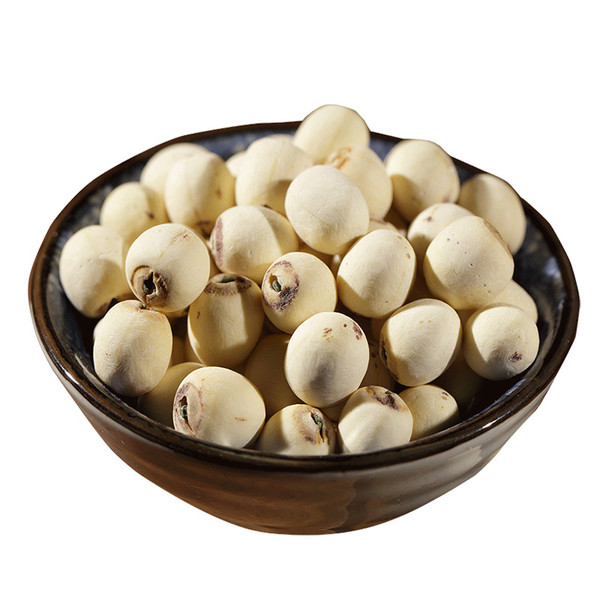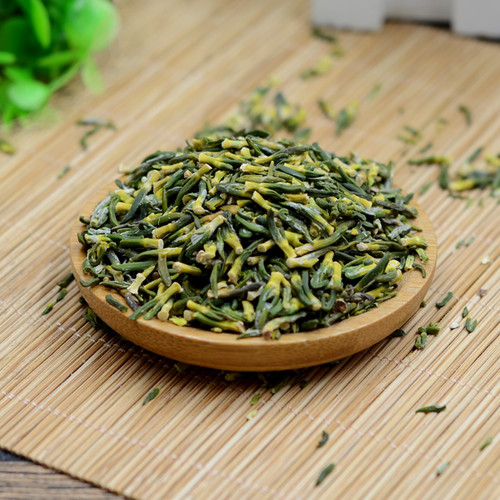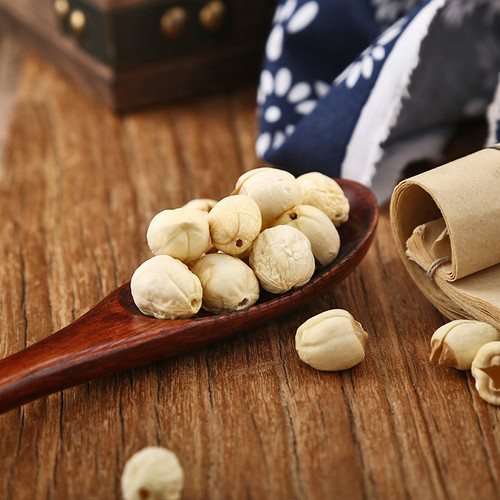Product Overview
Parts used: Dried ripe seed
TCM category: Herbs that stabilize and bind
TCM nature: Neutral
TCM taste(s): SourSweet
Meridian affinity: Spleen Heart Kidney
Scientific name: Nelumbo nucifera
Other names: Indian lotus, Sacred lotus, Bean of India, Egyptian bean, Lian zi
Use of lotus seeds (Lian Zi) in TCM
Please note that you should never self-prescribe TCM ingredients. A TCM ingredient is almost never eaten on its own but as part of a formula containing several ingredients that act together. Please consult a professional TCM practitionner, they will be best able to guide you.
Preparation: When the fruit is mature, the lotus is harvested, the seeds are removed, their outer peel is removed and they are dried.
Dosage: 6 - 15 grams
Main actions according to TCM*: Tonifies the Spleen, stops diarrhea. Strengthens the Kidneys, reinforces Essence. Nourishes the Blood and calms the mind.
Primary conditions or symptoms for which lotus seeds may be prescribed by TCM doctors*: Leukorrhagia Diarrhea Palpitations Restlessness Insomnia Loss of appetite Premature ejaculation Spermatorrhea Abnormal uterine bleeding
Contraindications*: Not for individuals with constipation and abdominal distention.
Common TCM formulas in which lotus seeds are used*:
For diarrhea and loose stools resulting from Spleen and Stomach Deficiency combine lotus seeds with yam (Shan Yao).
For Kidney Deficiency with symptoms of leukorrhea and seminal emissions combine lotus seeds with cuscuta seeds (Tu Si Zi) and foxnut seeds (Qian Shi).
For irritability, restlessness, nervous anxiety and insomnia combine lotus seeds with lily bulbs (Bai He), glehnia roots (Bei Sha Shen), jujube seeds (Suan Zao Ren), biota seeds (Bo Zi Ren) and poria-cocos mushrooms (Fu Ling).
For Yin and Blood deficiency with vaginal discharge, cloudy and dribbling urine combine lotus seeds with ginkgo nuts (Bai Guo) and foxnut seeds (Qian Shi).
For deficiency in the Lower Burner with watery vaginal discharge combine lotus seeds with ginkgo nuts (Bai Guo).
Key TCM concepts behind lotus seeds (Lian Zi)'s properties
In Traditional Chinese Medicine (TCM), lotus seeds are plants that belong to the 'Herbs that stabilize and bind' category. This category of herbs is used for treating abnormal discharges and displacement of organs. This includes conditions such as diarrhea, discharges from the vagina, penis or rectum as well as prolapse of the uterus or rectum. It is important to note that herbs in this category only treat symptoms, so one should also use herbs to treat the underlying Deficiency.
Furthermore lotus seeds are plants that are Neutral in nature. This means that lotus seeds typically don't affect the balance in your body. Balance between Yin and Yang is a key health concept in TCM. Eating too many "Hot" (Yang) ingredients can lead to an imbalance whereby one has a Yang excess. The inverse is true as well: too many "Cold" (Yin) ingredients can lead to a Yin excess. The Neutral nature of lotus seeds means that you don't have to worry about that!
Lotus seeds also taste Sour and Sweet. The so-called "five elements" theory in Chinese Medicine states that the taste of TCM ingredients is a key determinant of their action in the body. Sour ingredients like lotus seeds help with digestion and restrain abnormal discharges of fluids from the body, such as diarrhea or heavy sweating. On the other hand Sweet ingredients tend to slow down acute reactions and detoxify the body. They also have a tonic effect because they replenish Qi and Blood.
The tastes of ingredients in TCM also determine what organs and meridians they target. As such lotus seeds are thought to target the Spleen, the Heart and the Kidney. In TCM the Spleen assists with digestion, blood coagulation and fluid metabolism in the body. In addition to regulating blood flow, the Heart is believed to be the store of the "spirit" which basically refers to someone's vitality. The Kidneys do not only regulate the urinary system but also play a key role in the reproductive system and the growth and aging process of the body.
Use of lotus seeds (Lian Zi) as food
Lotus seeds are also eaten as food. It is used as an ingredient in dishes such as Lotus Seed Sweet Soup or Prawn with Lotus Seeds Stir-fry.






